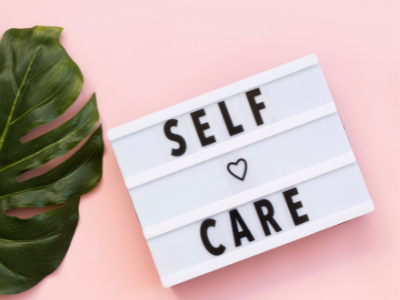We are programmed from a young age to equate productivity with value. While not a uniquely American value, our culture, especially as it relates to educational achievement and careers, celebrates those who invest long hours with no slowdown to achieving their goals. Elementary school attendance prizes come to mind as an early example.
Recent reports of workplace stress, burnout, and mental health crisis show how these ideas can come at a price, both to our individual health and economically. Pre-pandemic, the World Economic Forum estimated that the global price tag of burnout was $322 billion. We’ll likely see this number increase as post-pandemic data surfaces.
While interest in self-care and balance has hit an all-time high, many people don’t know how to combat the systemic and multi-generational message that to push through fatigue and ill-health is to succeed.
Like most new skills, rest takes practice. Here are three tips for practicing the kind of sustainable self-care that can reduce burnout, stress, and mental health crisis.
Re-define Self-Care
For too long, self-care in popular culture has been relegated to spa days and beauty regimes. Massages and facials can absolutely be a part of self-care, but this shouldn’t be the first place people go when running ragged.
To re-define self-care, let’s try asking the following questions when we begin to have trouble coping:
- What task can I get off my plate, either by getting help or writing it off, that will take a weight off my shoulders?
- Ideas: filing taxes, mowing the lawn, making a difficult medical appointment, deep cleaning the bathroom, sending thank you cards,
- Who can I spend time with or hire who will help me feel grounded, bring me joy and laughter, or help solve a tricky task (see above)?
- Ideas: a close nonjudgemental friend, therapist, primary care physician, housekeeper, paid consultant
- Rather than trying to go from a 3 to a 9 (on a scale of 1-10), what can I do right now to bring me from a 3 to a 4?
- Ideas: shower, eat, take a nap, call a helpline
Schedule rest and self-care
Especially for people working multiple jobs or remotely, it can be difficult to get basic needs met, which adds additional stress to our mental well-being. Adding non-negotiable time on our calendars to address these needs can help ensure we don’t drain our resources too much.
Here are a few ideas on how to do this:
- Schedule time for a walk every day. Is there a phone call you regularly make that you can combine with a walk?
- Switch to 50-minute meetings. Back-to-back meetings make it hard to find time to refill water cups, use the restroom, or do a short meditation. You likely won’t miss the extra 10 minutes in a meeting, but you’ll feel less worn out at the end of the day. Just resist the urge to check email at that time continually.
- Set quiet hours at home (especially on weekends) where everyone in the house rests, reads books, works on puzzles, or other solo activities. Even young children can be taught and benefit from scheduled quiet time.
Write down your self-care mantra
Sometimes we have to give ourselves permission to rest and take care of ourselves first. We may need to repeat that consent daily until it becomes a mantra. Then when we need rest most, it will be our second nature to claim that space.
Here are just a few ways we can permit ourselves to embrace and thrive with self-care:
- I don’t skip the self-care I’ve scheduled for myself, whether it’s a daily walk or a full day of rest.
- I don’t make myself responsible for other people’s feelings about me.
- On my days and hours off, I turn off my email and voicemail notifications.
- When someone helps me, I don’t say, “Sorry you had to do this.” Instead, I say, “thank you for helping me.”
Practice Makes Perfect
Self-care should mean something different to each person, as we all learn what works best to support our physical and mental health. And some days, we won’t get it right. Part of self-care is also having grace for ourselves when we throw everything we’ve learned out the window. The great thing about self-care is that it’s cumulative and compounding. The more we do, the greater our reserves are for the days when we just can’t find the time or motivation to take those self-care steps. But we need to build those habits when we are doing well.
In Crisis?
There is no substitute for professional mental health help and support when you are in crisis. Reach out to the 24/7 mental health line when you need support through a crisis.
- Travis County: 512-472-4357 (Integral Care)
- Bastrop, Burnet, Caldwell, Williamson Counties: 1-800-841-1255 (Bluebonnet Trail Community Services)
- Hays County: 1-877-466-0660 (Hill Country MHDD Centers)
- National: 1-800-273-8255


